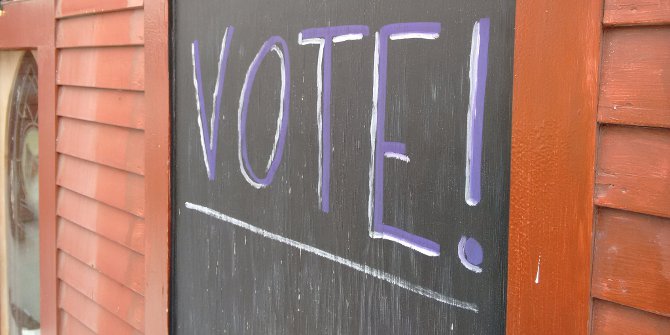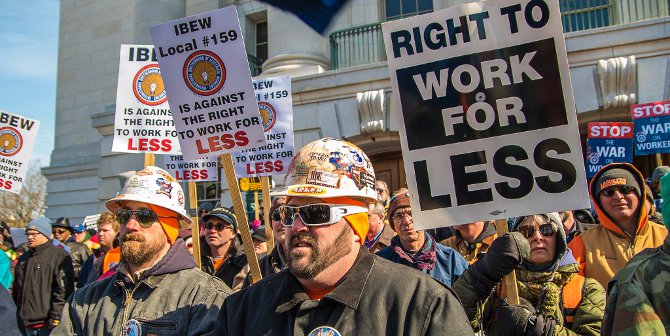 Candy Gibson of the LSE’s Press Office recently sat down with Peter Trubowitz, Director of the US Centre, to discuss what we can expect between now and Election Day.
Candy Gibson of the LSE’s Press Office recently sat down with Peter Trubowitz, Director of the US Centre, to discuss what we can expect between now and Election Day.
What are the key factors which will decide election – policies or personality?
I think voter turnout, mobilisation, and suppression will be key factors in this election. With less than 100 days to go, Clinton and Trump each start with about 40 percent of the electorate. These are people who will vote Democratic or Republican come hell or high water — the only question is whether they show up on Election Day and their votes are counted. The remaining 20 percent of the electorate — the ‘undecideds’ — are in play and it is here that policy positions and personality can impact the outcome. These are not necessarily voters in the so-called centre. Some are [Vermont Senator Bernie] Sanders voters on the left that Clinton needs to pick up; others are [Texas Senator Ted] Cruz voters that Trump needs to win over. But at the end of the day the outcome will be determined by who can get their core constituencies fired up, out to the polls, and counted at the ballot box.
Both Trump and Clinton are highly divisive with high disapproval ratings – will this affect voter turnout?
It could, though we really don’t have much history to go on here. I say that because it’s one thing to have one unpopular candidate in the race. This time we have two — the two least popular major-party picks in modern presidential politics. It’s thus easier to predict how this will affect their approaches to the campaign than how it will affect voter turnout. Because both have high disapproval numbers (Clinton’s currently is about 55 percent; Trump’s is just over 60 percent), both campaigns will find it easier to focus on their opponents character flaws rather than their own personal strengths. Thus we are going to hear a lot more about Trump’s comments about minorities, women, and taxes and Clinton’s emails, Benghazi, and ties to Wall Street. Will this turn off voters? Yes and no. It will likely have little effect on hard core Democrats and Republicans. Undecided voters may be another matter. Some may be inclined to sit out this election A highly negative campaign, which this one promises to be, won’t do much to get them off the couch and into the polling booth.
Election campaign has split both parties – how will they repair the cracks before the election?
The campaigns have created dilemmas for both sides. For Trump, the challenge is figuring out how to keep white college educated voters on side. They traditionally vote Republican, but they have misgivings about Trump’s views about race and immigration, his refusal to disclose his tax returns, and now his relationship with Russian President Vladimir Putin. Frankly, Trump’s biggest liability with this group of voters is himself — the less he talks about himself and trash-talks other people, the better he will do with these voters. But I wouldn’t hold my breath waiting for Trump 2.0. For Clinton, the challenge is figuring out how to win over Sanders’s supporters. She made a start at the Democratic convention. What she needs to do now is convince those voters that those efforts were genuine, and not just to guarantee a relatively smooth convention.
Why is Trump so popular, given he has offended so many potential voters?
Trump has capitalised on a wave of voter anger and resentment, especially among white blue collar voters. These voters flocked to him in the Republican primaries and there is little reason to think they will vote for Hillary Clinton, no matter how many people and groups Trump offends. These voters are less concerned about who Trump offends than they are about shaking things up in a Washington. Trump’s bet is that there are enough of these voters to win the 270 Electoral College votes he needs to win the election. It’s a high risk strategy that leaves him a very narrow electoral path to the White House.
Clinton’s historic candidacy is not making the same impact as Obama’s back in 2008 – why not?
The first thing to say is that for many voters in America, Hillary Clinton’s nomination is a very big deal, and rightly so. She is, after all, the first female presidential candidate for from a major party. That said, Obama’s run in 2008 generated more enthusiasm and interest. One reason is that Obama represented the hopes and dreams of many young people. This year Bernie Sanders was that candidate, not Hillary. Another is that Obama came out of nowhere — he first stepped onto the national stage in 2004 when he gave the keynote address to the Democratic convention. Clinton has been “in the arena” for over forty years. She is well known, with all that entails in contemporary American politics.
Please read our comments policy before commenting.
Note: This article gives the views of the author, and not the position of USAPP – American Politics and Policy, nor the London School of Economics.
Shortened URL for this post: http://bit.ly/2aNwLPj
_________________________________
 Peter Trubowitz – LSE US Centre
Peter Trubowitz – LSE US Centre
Peter Trubowitz is Professor of International Relations, and Director of the LSE’s US Centre. His main research interests are in the fields of international security and comparative foreign policy, with special focus on American grand strategy and foreign policy. He also writes and comments frequently on U.S. party politics and elections and how they shape and are shaped by America’s changing place in the world.






